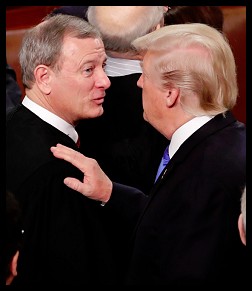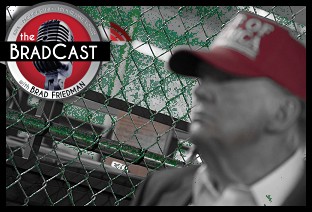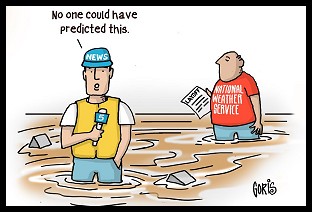
In Trump v. Vance, the President of the United States sued to block Manhattan District Attorney Cyrus Vance's subpoena of Donald Trump's accounting firm Mazar's USA. The subpoena seeks financial records that may expose criminal violations of NY law. Those potential violations include, but are not limited to, the sworn allegations presented by Trump's former attorney, Michael Cohen, that the President falsified loan applications and other financial documents.
The fact that the Supreme Court, as observed by Justice Brett Kavanaugh in his concurring opinion in Vance, "unanimously" agreed that "a President does not possess absolute immunity from a state criminal subpoena" is great news for those who are concerned about the threat the Trump administration poses to the survival of the rule of law. However, the Court's decision to remand the case to the District Court where President Donald J. Trump "may," per the majority opinion, "raise further arguments as appropriate" makes it unlikely that a New York grand jury will acquire the potentially incriminating records that might otherwise justify the issuance of a criminal indictment prior to the November 3. 2020 election.
Given the majority's conclusion, in Vance --- that the President's right to object to compliance with a criminal subpoena is no greater than the rights enjoyed by all private citizens --- it's unlikely Trump will prevail at the District Court level. However, the remand will allow Trump's legal counsel to seek further delays via stay requests associated with future appeals.
In a companion case, Trump v. Mazars USA, LLP --- in which Trump sued to block several Congressional Committees from obtain Trump's tax and other financial documents as part of their legislative oversight --- the Court vacated a District Court order compelling Trump to turn over financial records to Congress. Although the Court, in this case, left open the possibility that the District Court could again order the same financial records to be turned over to Congress after careful consideration of Separation of Powers issues. In this case as well, it is now highly unlikely that the records would be forthcoming to Congress prior to the Election.
The net result is that the Supreme Court has probably deprived the U.S. electorate of access to potentially incriminating financial records prior to the pivotal Presidential Election. That doesn't bode well for small "d" democratic accountability, which can only be accomplished when the electorate is "well informed". That's especially ironic given that even President Richard M. Nixon conceded that We the People have a right "to know whether or not their President is a crook."
UPDATE 8/4/20: Subsequent court orders, an expedited briefing schedule and legal filings suggest that a Manhattan grand jury may actually receive the withheld financial records by early September.
In a July 16 order [PDF], U.S. District Court Judge Victor Moreno adopted the parties' agreed upon expedited schedule, to wit: Trump was to file a second amended complaint by July 27. Vance could answer or move to dismiss by Aug. 3. Vance timely filed a motion to dismiss [PDF]. Trump has until Aug. 10 to file a brief in opposition to the motion to dismiss; Vance until Aug. 14 to file a reply.
On July 17, the Supreme Court issued an order granting Vance's request that the Supreme Court's July 9 decision be effective immediately --- as opposed to the usual 25 days after it was issued.
In his July 16 order, Judge Morero recited the following with respect to Vance's legal posture:
The President states that he may argue that the subpoena "is motivated by a desire to harass or is conducted in bad faith…or that the subpoena is meant to 'manipulate' his policy decisions or to retaliate against him for official acts.' But this Court has already found there was no demonstrated bad faith, harassment, or any other unusual circumstance that would call for equitable relief. And this Court has rejected the President's claim that there was any evidence of a 'secondary motive' that goes beyond good faith enforcement of criminal laws.
In his erudite motion to dismiss Trump's Second Amended Complaint, which was co-authored by Walter E. Dellinger, III, a Duke Law Professor who had previously served as an Assistant Attorney General and as the head of the Department of Justice Office of Legal Counsel, Vance lays out the reasons why the Second Amended Complaint must be dismissed and the records promptly produced.
Trump's newest filing, Vance asserts, merely "repeats a conspiratorial assertion [the President] has unsuccessfully pressed for nearly a year to all three levels of the federal courts." The only "new" allegation is the claim the subpoena is over-broad because it seeks financial records dating back to 2011. This "new" allegation is based upon the factually erroneous assumption that Vance's investigation is confined to the 2016 "hush money" payments that were the source of the allegations leveled by Michael Cohen, the President's former lawyer. (Cohen was convicted for his role in the "hush money" scheme.)
In actuality, Vance points out, the subpoena goes back to 2011 because the grand jury, on the basis of publicly revealed evidence, is investigating "potentially improper financial transactions by a variety of individuals and entities over a period of years."
In the motion, Vance based assertion on Cohen's Congressional testimony and cited Washington Post and Wall Street Journal articles. Turns out, the Manhattan DA has additional information in his possession, according to a The New York Times article that was published one day after Vance filed the motion to dismiss. Last year, Deutsche Bank turned over the Trump organization's financial records to Vance's office pursuant to a subpoena. Thus, it's likely Vance already has evidence in his possession to support the assertion, set forth in the motion, that the NY grand jury subpoenas of financial records held by Mazars relate to decades-long "alleged insurance and bank fraud by the Trump Organization and its officers".
Given Judge Marrero's rejections of the President's prior identical legal arguments, and the already significant delay incurred, it's likely that, following a hearing, a new order compelling compliance with the subpoena will soon issue. It's unlikely further stays will be granted. Thus, it's likely, a NY grand jury will receive the financial records by early September. If those records are incriminating, the intriguing question is to whether Vance, who is not hampered by DOJ rules against initiating an action, could promptly seek and deliver an October Surprise in the form of an unprecedented indictment of a sitting President.
 Ernest A. Canning is a retired attorney, author, and Vietnam Veteran (4th Infantry, Central Highlands 1968). He previously served as a Senior Advisor to Veterans For Bernie. Canning has been a member of the California state bar since 1977. In addition to a juris doctor, he has received both undergraduate and graduate degrees in political science. Follow him on twitter: @cann4ing
Ernest A. Canning is a retired attorney, author, and Vietnam Veteran (4th Infantry, Central Highlands 1968). He previously served as a Senior Advisor to Veterans For Bernie. Canning has been a member of the California state bar since 1977. In addition to a juris doctor, he has received both undergraduate and graduate degrees in political science. Follow him on twitter: @cann4ing


 Repub Support for Immigrants Skyrockets Amid Trump's Crackdown: 'BradCast' 7/14/25
Repub Support for Immigrants Skyrockets Amid Trump's Crackdown: 'BradCast' 7/14/25  Sunday 'Totally Predictable' Toons
Sunday 'Totally Predictable' Toons Democracy STILL Our Best Way Out of This Mess -- And Repubs Know It: 'BradCast' 7/10/25
Democracy STILL Our Best Way Out of This Mess -- And Repubs Know It: 'BradCast' 7/10/25 'Green News Report' 7/10/25
'Green News Report' 7/10/25
 'Mass Shooter Subsidy'?: More Dumb, Deadly Stuff in Trump's New Law: 'BradCast' 7/9/25
'Mass Shooter Subsidy'?: More Dumb, Deadly Stuff in Trump's New Law: 'BradCast' 7/9/25  Trump's New Law Supersizes ICE, Mass Detention, Militarization: 'BradCast' 7/8/25
Trump's New Law Supersizes ICE, Mass Detention, Militarization: 'BradCast' 7/8/25  'Green News Report' 7/8/25
'Green News Report' 7/8/25 Texas Flooding Tragedy Was Both Predictable and Predicted: 'BradCast' 7/7/25
Texas Flooding Tragedy Was Both Predictable and Predicted: 'BradCast' 7/7/25 Sunday 'Big Billionaire Bonanza' Toons
Sunday 'Big Billionaire Bonanza' Toons Sunday 'Total Obliteration' Toons
Sunday 'Total Obliteration' Toons 'Green News Report' 6/26/25
'Green News Report' 6/26/25 Thank You For Your Attention to This Matter:
Thank You For Your Attention to This Matter: Mamdani Primary 'Win' Augurs New Era of Rising Progressives: 'BradCast' 6/25/25
Mamdani Primary 'Win' Augurs New Era of Rising Progressives: 'BradCast' 6/25/25 U.S. Authoritarianism Under-way (But We're Still Here to Fight It): 'BradCast' 6/24/25
U.S. Authoritarianism Under-way (But We're Still Here to Fight It): 'BradCast' 6/24/25 'Anti-War' Trump Attacks Iran on False Claims About WMD: 'BradCast' 6/23/25
'Anti-War' Trump Attacks Iran on False Claims About WMD: 'BradCast' 6/23/25 Senate Health Care Cuts 'More Extreme' Than House Version: 'BradCast' 6/19/25
Senate Health Care Cuts 'More Extreme' Than House Version: 'BradCast' 6/19/25 What 'Anti-War President'? MAGA Civil War Over Trump, Iran: 'BradCast' 6/18/25
What 'Anti-War President'? MAGA Civil War Over Trump, Iran: 'BradCast' 6/18/25 Trump's 'Remigration' is Code for 'Ethnic Cleansing': 'BradCast' 6/17/25
Trump's 'Remigration' is Code for 'Ethnic Cleansing': 'BradCast' 6/17/25 Last Weekend Today: 'BradCast' 6/16/25
Last Weekend Today: 'BradCast' 6/16/25
 VA GOP VOTER REG FRAUDSTER OFF HOOK
VA GOP VOTER REG FRAUDSTER OFF HOOK Criminal GOP Voter Registration Fraud Probe Expanding in VA
Criminal GOP Voter Registration Fraud Probe Expanding in VA DOJ PROBE SOUGHT AFTER VA ARREST
DOJ PROBE SOUGHT AFTER VA ARREST Arrest in VA: GOP Voter Reg Scandal Widens
Arrest in VA: GOP Voter Reg Scandal Widens ALL TOGETHER: ROVE, SPROUL, KOCHS, RNC
ALL TOGETHER: ROVE, SPROUL, KOCHS, RNC LATimes: RNC's 'Fired' Sproul Working for Repubs in 'as Many as 30 States'
LATimes: RNC's 'Fired' Sproul Working for Repubs in 'as Many as 30 States' 'Fired' Sproul Group 'Cloned', Still Working for Republicans in At Least 10 States
'Fired' Sproul Group 'Cloned', Still Working for Republicans in At Least 10 States FINALLY: FOX ON GOP REG FRAUD SCANDAL
FINALLY: FOX ON GOP REG FRAUD SCANDAL COLORADO FOLLOWS FLORIDA WITH GOP CRIMINAL INVESTIGATION
COLORADO FOLLOWS FLORIDA WITH GOP CRIMINAL INVESTIGATION CRIMINAL PROBE LAUNCHED INTO GOP VOTER REGISTRATION FRAUD SCANDAL IN FL
CRIMINAL PROBE LAUNCHED INTO GOP VOTER REGISTRATION FRAUD SCANDAL IN FL Brad Breaks PA Photo ID & GOP Registration Fraud Scandal News on Hartmann TV
Brad Breaks PA Photo ID & GOP Registration Fraud Scandal News on Hartmann TV  CAUGHT ON TAPE: COORDINATED NATIONWIDE GOP VOTER REG SCAM
CAUGHT ON TAPE: COORDINATED NATIONWIDE GOP VOTER REG SCAM CRIMINAL ELECTION FRAUD COMPLAINT FILED AGAINST GOP 'FRAUD' FIRM
CRIMINAL ELECTION FRAUD COMPLAINT FILED AGAINST GOP 'FRAUD' FIRM RICK SCOTT GETS ROLLED IN GOP REGISTRATION FRAUD SCANDAL
RICK SCOTT GETS ROLLED IN GOP REGISTRATION FRAUD SCANDAL VIDEO: Brad Breaks GOP Reg Fraud Scandal on Hartmann TV
VIDEO: Brad Breaks GOP Reg Fraud Scandal on Hartmann TV RNC FIRES NATIONAL VOTER REGISTRATION FIRM FOR FRAUD
RNC FIRES NATIONAL VOTER REGISTRATION FIRM FOR FRAUD EXCLUSIVE: Intvw w/ FL Official Who First Discovered GOP Reg Fraud
EXCLUSIVE: Intvw w/ FL Official Who First Discovered GOP Reg Fraud GOP REGISTRATION FRAUD FOUND IN FL
GOP REGISTRATION FRAUD FOUND IN FL

































